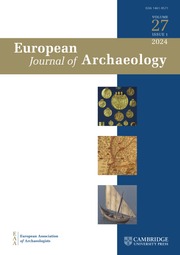Article contents
Negotiating the Past in the Present: Italian Prehistory, Civic Museums, and Curatorial Practice in Emilia-Romagna, Italy
Published online by Cambridge University Press: 25 January 2017
Abstract
The latter half of the nineteenth century witnessed the establishment of prehistoric archaeology as a scientific discipline in Italy, as well as the founding of the Italian nation state. Evolutionism, positivism, and a sense of national identity informed prehistoric research and the activities of individuals, such as Strobel, Pigorini, and Chierici, who are regarded today as the founding fathers of Italian prehistory. It is in this dynamic cultural and political climate that the civic museums of Reggio Emilia, Modena, and Bologna were created, both as a response to intense local archaeological activity and in reaction to the centralizing structure of the newly formed kingdom of Italy. These civic museums were among the first museums of prehistory in Italy and the products of the cultural and political climate of late nineteenth-century Europe. This article explores the circumstances surrounding the foundation of these museums and considers how the work of the first prehistorians and the museums' own histories, as civic and cultural institutions, continues to affect their role and management in the present.
Pendant la deuxième moitié du 19e siècle on a pu assister à l'établissement de l'archéologie préhistorique comme discipline scientifique en Italie, de même qu'à la fondation de l'état-nation italien. L'Evolutionnisme, le positivisme et un sentiment d'identité nationale influençaient la recherche préhistorique et les activités d'individus comme Strobel, Pigorini et Chierici, considérés aujourd'hui comme les pères fondateurs de la préhistoire italienne. C'est dans ce dynamique climat culturel et politique que furent créés les musées municipaux de Reggio d' Emilie, Modène et Bologne, d'une part comme réponse à l'intense activité archéologique locale et en même temps comme réaction à la structure centralisatrice du nouvel royaume italien. Ces musées municipaux figuraient parmi les premiers musées de préhistoire en Italie et étaient les produits du climat culturel et politique de l'Europe de la fin du 19e siècle. Cet article étudie les circonstances entourant la fondation de ces musées et examine comment le travail des premiers préhistoriens et le passé individuel des musées, comme institutions municipales et culturelles, continue à avoir un impact sur leur rôle et leur gestion dans le présent.
Zusammenfassung
In der zweiten Hälfte des 19. Jhs. wurde die Prähistorische Archäologie in Italien als wissenschaftliche Disziplin zeitgleich mit der Errichtung der italienischen Nation etabliert. Evolutionismus, Positivismus und das Gefühl der nationalen Identität beeinflussten die Forschung und die Aktivitäten von Einzelpersonen wie Strobel, Pigorini und Chierici, die heute als Gründerväter der italienischen Vorgeschichtsforschung angesehen werden. In diesem dynamischen kulturellen und politischen Klima wurden die Regionalmuseen in Reggio nell'Emilia, Modena und Bologna als Echo intensiver archäologischer Aktivitäten und in Reaktion auf die zentralisierte Struktur des neu geschaffenen Königreichs Italien eingerichtet. Diese Regionalmuseen gehörten zu den ersten Vorgeschichtsmuseen in Italien und waren die Produkte des kulturellen und politischen Klimas Europas im späten 19. Jahrhundert. Dieser Beitrag untersucht die Umstände die die Gründung dieser Museen begleiteten und betrachtet, wie die Arbeit der ersten Vorgeschichtsforscher und die Geschichte der Museen – als regionale und kulturelle Institutionen – ihre Rolle und Lenkung in der Gegenwart weiter beeinflussen.
L'ultima metà del diciannovesimo secolo vide la formazione dell'archeologia preistorica come disciplina scientifica in Italia e la fondazione dello stato italiano. L'evoluzionismo, il positivismo e un senso di identità nazionale caratterizzarono la ricerca preistorica e guidarono l'attività di personaggi come Strobel, Pigorini e Chierici, che sono considerati oggi i padri fondatori della preistoria italiana. Fu in questo dinamico clima culturale e politico che i musei civici di Reggio Emilia, Modena e Bologna furono istituiti, sia come risposta all'intensa attività archeologica locale che come reazione alla struttura centralizzatrice del regno d'Italia recentemente formatosi. Questi musei civici furono tra i primi musei di preistoria in Italia e i prodotti del clima culturale e politico dell'Europa del tardo ottocento. Questo articolo esplora le circostanze della loro fondazione e considera l'impatto che l'attività dei primi studiosi di preistoria e il passato dei musei, intesi come istituzioni culturali e civiche, continuano ad avere sul ruolo e sulla gestione dei musei nel presente.
Keywords
- Type
- Articles
- Information
- Copyright
- Copyright © 2010 SAGE Publications
References
- 3
- Cited by


